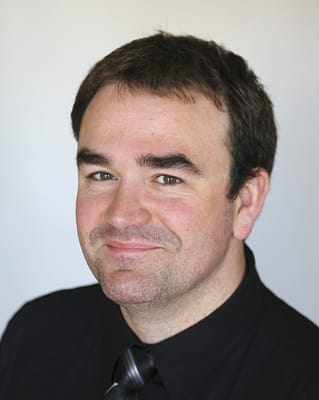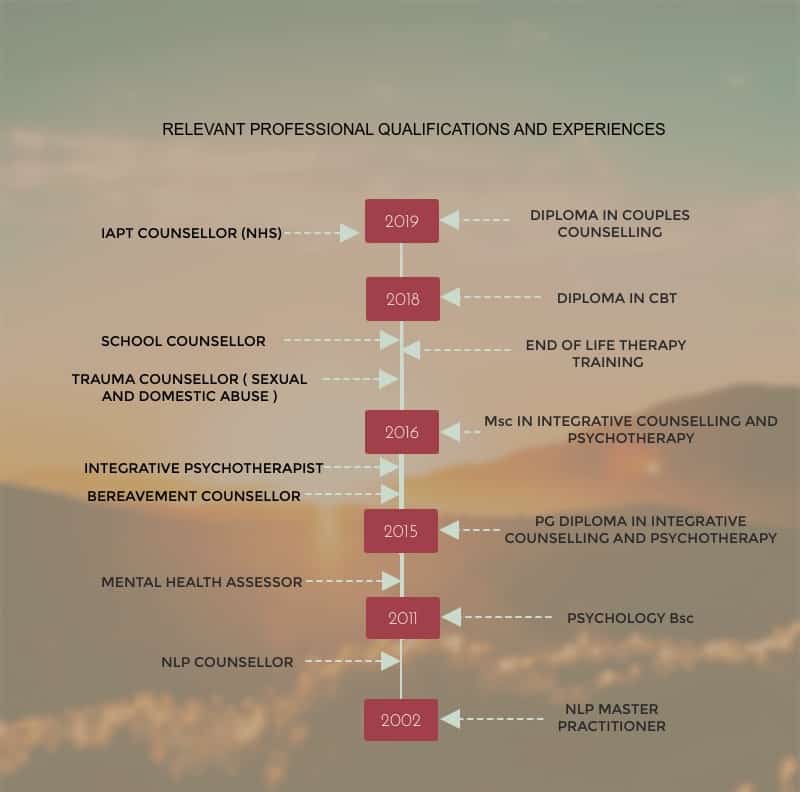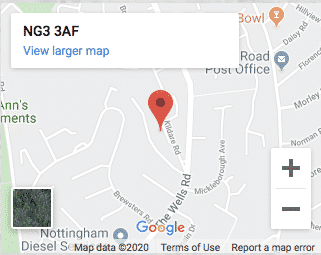

Due to the COVID-19 lockdown I'm offering online sessions via Skype and over the telephone.
About
What Happens in Therapy?
Therapy can help you by making you aware of how your mind works.
Everything I do in the therapy room is influenced by scientific research.
Learning to understand and manage feelings and behaviours can help you build better relationships, overcome obstacles, and enable you to live a more satisfying life.

Therapy is a relationship that heals
You might have a problem you can label, such as depression or anxiety, but perhaps you are simply unhappy and feel something is not right.
A great deal of these feelings arose due to the relationships you had when you were growing up. Everyone needs to feel connected. We need to feel accepted, loved, and celebrated.
When this is not the case, we can carry emotional difficulties into adulthood.
My primary approach is called integrative relational therapy. It means that in therapy, we will work on the internal and external obstacles that are preventing you from being in sustaining and happy relationships that might be holding you back.
The goal is to help you thrive in the present, although we might talk about past relationships and experiences and how they might have impacted you.

The Reward Is A New Life
Therapy is a journey that requires commitment and dedication. However, the benefits can lead to higher self-esteem, self-understanding, trust, and happiness.
We will talk about feelings and thoughts that you might have bottled up for a long time so you can understand yourself better. Some people find therapy overwhelming at first, so it is essential that we pace the work according to your specific needs. You might have pushed away feelings and thoughts because they were too tough to face on your own. This time you don’t have to do it alone. Working through your difficulties with an experienced professional can make all the difference.
Hi, I’m John

Us therapists fall into two broad approaches to therapy. We both care deeply about our clients, but our work with them differs in some important ways.
We might call the first approach the “medical model”, where the therapist will assess if you meet the criteria for mental health diagnosis, and you will set clearly defined goals for your work together. Usually, there is limited time for the work to complete.
They will teach you coping techniques and directions, trying to relieve your symptoms. This approach is most helpful if your symptoms are so severe you find it hard to cope, and you need immediate relief. It is also useful if you are recovering, but you need some additional pointers.
However, I find the improvements it brings about are usually short-lived and often leave clients feeling frustrated and feeling like therapy doesn’t work.
In contrast, my approach consists of using my training and experience to work alongside you at your own pace, figuring answers together rather than providing explicit directions.
Respecting your goals and who you are as a person are the cornerstones of my work in therapy. This approach is more involved, but it can help bring about long-lasting relief and enduring improvement in your quality of life.
During my life, I had my fair share of grieving and challenges, and I remember times when it felt like there was very little hope. By working through those times in therapy and during my training years, I realised that IT IS POSSIBLE!
It is possible not just to feel slightly better but to feel happy and content. It is possible to grow and develop as a person. My personal experience profoundly impacts my work as it allows me to relate to my clients and make a difference in their lives through therapy.
I care deeply about every one of my clients, and I strive to be genuine, attentive and empathetic. I have also undergone extensive training to allow me to translate that empathy into real change for my clients’ lives.
I have worked in the NHS providing short and medium-term support successfully helping people with a wide range of issues. I also have experience in providing long term trauma counselling, bereavement and end of life therapy, EAP helpline work, coaching and NLP. Overall I have over ten years of experience providing counselling and NLP. Please see the infographic below to find out more about my experience.
If You Are Ready To Get Started
Hi, I’m John
Us therapists fall into two broad approaches to therapy. We both care deeply about our clients, but our work with them differs in some important ways.
We might call the first approach the “medical model”, where the therapist will assess if you meet the criteria for mental health diagnosis, and you will set clearly defined goals for your work together. Usually, there is limited time for the work to complete.
They will teach you coping techniques and directions, trying to relieve your symptoms. This approach is most helpful if your symptoms are so severe you find it hard to cope, and you need immediate relief. It is also useful if you are recovering, but you need some additional pointers. However, I find the improvements it brings about are usually short-lived and often leave clients feeling frustrated and feeling like therapy doesn’t work.
In contrast, my approach consists of using my training and experience to work alongside you at your own pace, figuring answers together rather than providing explicit directions.

Respecting your goals and who you are as a person are the cornerstones of my work in therapy. This approach is more involved, but it can help bring about long-lasting relief and enduring improvement in your quality of life.
During my life, I had my fair share of grieving and challenges, and I remember times when it felt like there was very little hope. By working through those times in therapy and during my training years, I realised that IT IS POSSIBLE! It is possible not just to feel slightly better but to feel happy and content. It is possible to grow and develop as a person. My personal experience profoundly impacts my work as it allows me to relate to my clients and make a difference in their lives through therapy.
I care deeply about every one of my clients, and I strive to be genuine, attentive and empathetic. I have also undergone extensive training to allow me to translate that empathy into real change for my clients’ lives.
I have worked in the NHS providing short and medium-term support successfully helping people with a wide range of issues. I also have experience in providing long term trauma counselling, bereavement and end of life therapy, EAP helpline work, coaching and NLP. Overall I have over ten years of experience providing counselling and NLP. Please see the infographic below to find out more about my experience.
I am accredited by the UKCP and I am member of BACP. This means that I abide by their code of ethics.
"We repeat what we don't repair"

Due to the COVID-19 lockdown I'm offering online sessions via Skype and over the telephone.
Contact Me If You Are Ready To Take The Next Step
Kildare Rd Nottingham NG33AF
Exact address withheld for privacy. I will give you my full address privately for our first session.



 WhatsApp Me!
WhatsApp Me!